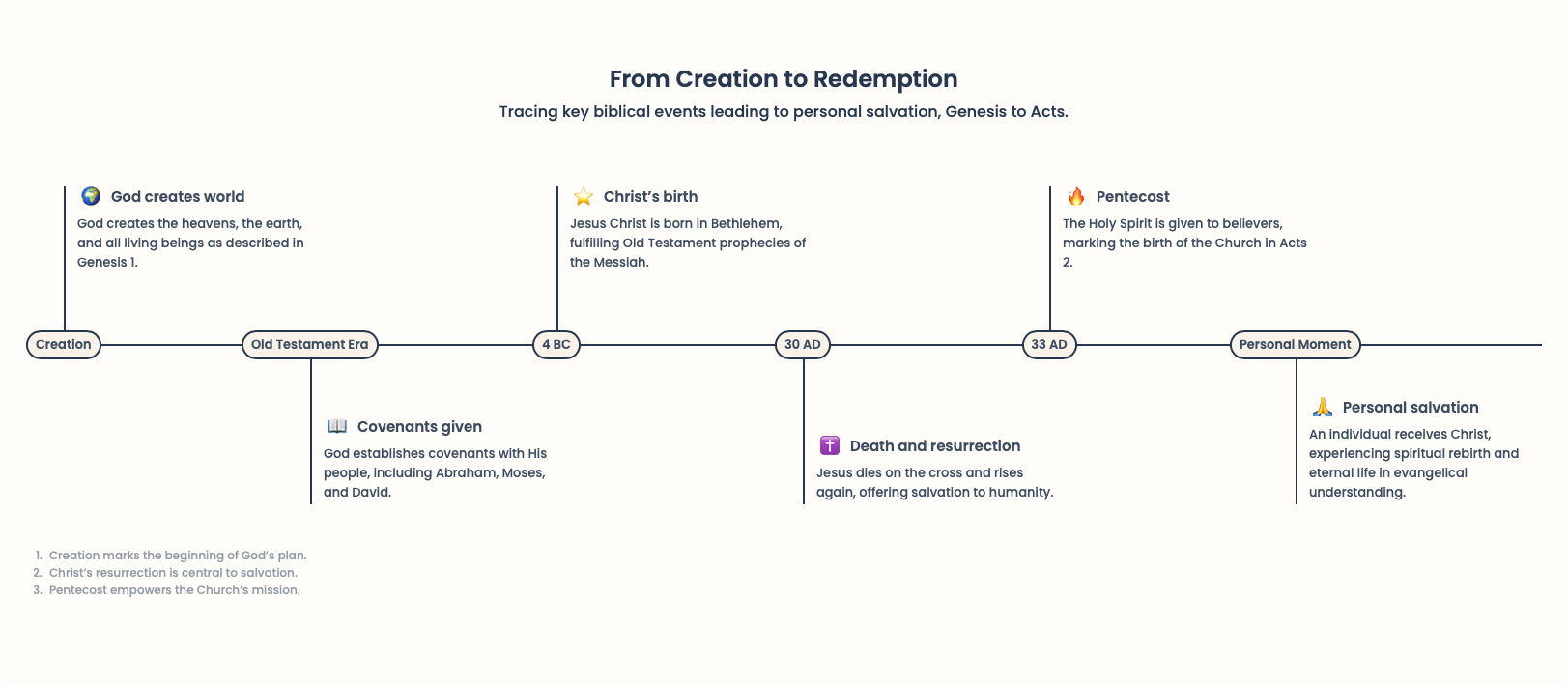In discussions on salvation, theology often gets tangled in complex interpretations—especially around the terms election and predestination. These words, frequently assumed to be interchangeable and linked to salvation, are often misunderstood. This article aims to be an introductory clarification about what Scripture truly teaches about these concepts, contrasting them with the common Calvinist and Arminian perspectives.
The Simplified Timeline of Redemption
To ground the discussion, imagine a simple chart that begins with Creation and moves through the Old Testament, then to Christ’s coming, His death and resurrection, followed by Pentecost, when the Holy Spirit was given in Acts 2. Somewhere after that, an individual receives Christ—the moment of personal salvation as understood in most evangelical contexts.
Election According to Calvinism and Arminianism
In John Calvin’s system, election is unconditional. God chooses individuals for salvation without any condition being met by the person. This concept places election before creation and makes it a fixed decree independent of human belief or response. A consequence of this—uncomfortable for many Calvinists—is that by making such choice, God decides both those who are saved and those who are damned.
Arminius, himself brought up in Calvinism, also envisions election as occurring before time, but introduces foreknowledge as the condition. Based on 1 Peter 1:2, Arminians argue that God chooses based on knowing in advance who will believe. The obvious problem Arminianism tries to solve is that of faith being essentially redundant in the Calvinistic system, which does not square well with biblical truth.
However, this retains the same basic structure as Calvinism: election is still viewed as God selecting individuals for salvation before they ever exist, with foreknowledge being the only added element.
The Biblical Meaning of Election
The Greek word often translated as “chosen” is ἐκλέγομαι (eklegomai), such as in Ephesians 1:4—“chosen in him before the foundation of the world.” The key phrase here is “in Him.” Calvinists often overlook this. Importantly, the word eklegomai never refers to salvation in the New Testament.
This is not just a theological opinion; it is a linguistic fact. Not one occurrence of eklegomai in the New Testament describes someone being chosen for salvation. Even 2 Thessalonians 2:13, which is sometimes cited in this context, uses a different Greek word, and the verse itself describes a salvation that comes through something: belief in the truth and sanctification by the Spirit. Moreover, this salvation is clearly future-oriented—it refers to the final glorification, not the initial moment of belief.
In fact, salvation in the Bible is presented in three tenses:
- Past – the moment one believes in Christ.
- Present – the ongoing process of being conformed to Christ.
- Future – final glorification in heaven.
2 Thessalonians 2:13 and 1 Peter 1:4–9 refer to this future salvation.
Predestination and Election are Not the Same
One of the major errors in both Calvinist and Arminian camps is using election and predestination as if they mean the same thing. They are not synonymous:
- Election is always about being chosen for service, not salvation.
- Predestination refers specifically to the future glorification of those who are already saved.
For example, in Romans 11:28, Paul refers to certain Jews as part of the “elect” even though they are enemies of the gospel. This shows that election does not necessarily mean being saved. In this instance (as many others) it refers to Jews as they remain the elected (chosen) people of God.
The overlap between being saved and being chosen for service is high in the current era, but they are not the same thing, as unbelieving Jews are still elected (chosen people).
Predestination, biblically understood, does not occur before creation. In a sense, for a Christian it begins after a person has believed in Christ. Put it simply, believers are predestined to be glorified, conformed to the image of Christ, and to receive the adoption, which is the redemption of the body.
Summary
| Concept | Calvinism & Arminianism | Biblical Teaching (Pauline) |
|---|---|---|
| Election | Chosen for salvation before creation | Chosen for service, not salvation |
| Predestination | Destiny to salvation before existence | Destiny to glorification after salvation |
Understanding the difference is critical to rightly dividing the Word of truth. Much of the confusion stems from conflating these distinct ideas and applying them out of context.


Leave a Reply